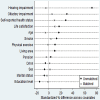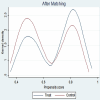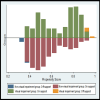Effect of visual impairment on subjective cognitive decline in older adults: a cross-sectional study in China
- PMID: 38688669
- PMCID: PMC11086556
- DOI: 10.1136/bmjopen-2023-072626
Effect of visual impairment on subjective cognitive decline in older adults: a cross-sectional study in China
Abstract
Objective: People with visual impairment have more functional limitations associated with subjective cognitive decline (SCD), and those with SCD are extremely susceptible to transitioning to irreversible cognitive impairment. This study aimed to explore if visual impairment is a significant predictor of SCD compared with other socioeconomic and health factors associated with SCD.
Design: Cross-sectional study.
Setting and participants: The investigation aimed to assess the factors influencing SCD among 428 participants aged 60 and above in Zhaoyuan, China.
Primary outcome measures: The primary outcome variable was SCD, measured by the Chinese version of SCD questionnaire. Multiple logistic regression and propensity score matching (PSM) were used to analyse the influence of visual impairment on the subjective cognition of the elderly.32.2% of the elderly were experiencing SCD. Older adults with SCD showed a higher prevalence of visual impairment (72.5%) than the elderly without SCD (58.6%) (P=0.006). Multivariate logistic regression analysis showed that bad self-reported health status, lack of physical exercise and visual impairment were the risk factors for SCD in older adults, while more than 9 years of education was a protective factor. In addition, PSM model showed that after eliminating the dominant biases caused by the individual observable heterogeneity of older adults with and without visual impairment, the risk of SCD in the elderly with visual impairment was increased by 13.6%-14.5% and the difference was statistically significant (P<0.05).
Conclusions: It was found that older adults experiencing visual impairments are at an elevated risk of developing SCD compared with their counterparts without such impairments. Additionally, visual impairment remains a significant risk factor for SCD in the elderly, even adjusting for potential biases arising from individual observable heterogeneity.
Keywords: aged; geriatric medicine; quality in health care.
© Author(s) (or their employer(s)) 2024. Re-use permitted under CC BY-NC. No commercial re-use. See rights and permissions. Published by BMJ.
Conflict of interest statement
Competing interests: None declared.
Figures




Similar articles
-
Association Between Dietary Diversity and Subjective Cognitive Decline in the Middle-Aged and Elderly Chinese Population: A Cross-Sectional Study.Nutrients. 2024 Oct 23;16(21):3603. doi: 10.3390/nu16213603. Nutrients. 2024. PMID: 39519436 Free PMC article.
-
Associations between Physical Activity and Cognitive Functioning among Middle-Aged and Older Adults.J Nutr Health Aging. 2017;21(6):637-647. doi: 10.1007/s12603-016-0835-6. J Nutr Health Aging. 2017. PMID: 28537327 Free PMC article.
-
Prevalence of Cognitive Frailty Phenotypes and Associated Factors in a Community-Dwelling Elderly Population.J Nutr Health Aging. 2020;24(2):172-180. doi: 10.1007/s12603-019-1286-7. J Nutr Health Aging. 2020. PMID: 32003407
-
The relationship between social networks and subjective cognitive decline in Chinese younger older adults: the mediating effect of self-perception of aging.BMC Public Health. 2025 May 23;25(1):1902. doi: 10.1186/s12889-025-23074-8. BMC Public Health. 2025. PMID: 40410710 Free PMC article.
-
High prevalence of subjective cognitive decline in older Chinese adults: a systematic review and meta-analysis.Front Public Health. 2023 Dec 1;11:1277995. doi: 10.3389/fpubh.2023.1277995. eCollection 2023. Front Public Health. 2023. PMID: 38106895 Free PMC article.
Cited by
-
Prevalence and risk factors of subjective cognitive decline in older adults in Baotou, China: a cross-sectional study.Front Aging Neurosci. 2024 Oct 9;16:1422258. doi: 10.3389/fnagi.2024.1422258. eCollection 2024. Front Aging Neurosci. 2024. PMID: 39444802 Free PMC article.
-
Association Between Dietary Diversity and Subjective Cognitive Decline in the Middle-Aged and Elderly Chinese Population: A Cross-Sectional Study.Nutrients. 2024 Oct 23;16(21):3603. doi: 10.3390/nu16213603. Nutrients. 2024. PMID: 39519436 Free PMC article.
References
Publication types
MeSH terms
LinkOut - more resources
Full Text Sources
Medical
Research Materials
Miscellaneous
